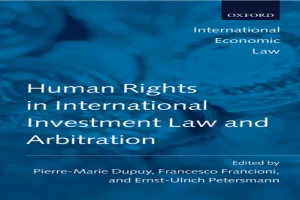Newly released
This book is new and will be uploaded as soon as it becomes available to us and if we secure the necessary publishing rights.

Human Rights in International Investment Law and Arbitration Book PDF
(0)
Author:
Francesco FrancioniNumber Of Reads:
64
Language:
English
Category:
Social sciencesSection:
Pages:
646
Quality:
good
Views:
1058
Quate
Review
Save
Share
New
Book Description
This book offers a systematic analysis of the interaction between international investment law, investment arbitration and human rights, including the role of national and international courts, investor-state arbitral tribunals and alternative jurisdictions, the risks of legal and jurisdictional fragmentation, the human rights dimensions of investment law and arbitration, and the relationships of substantive and procedural principles of justice to international investment law.
Part I summarizes the main conclusions of the 24 book chapters and places them into the broader context of the principles of justice, global administrative law and multilevel constitutionalism that may be relevant for the administration of justice in international economic law and investor-state arbitration. Part II includes contributions clarifying the constitutional dimensions of transnational investment disputes and investor-state arbitration, as reflected in the increasing number of arbitral awards and amicus curiae submissions addressing human rights concerns. Part III addresses the need for principle-oriented ordering and the normative congruence of diverse national, regional and worldwide legal regimes, focusing on the pertinent dispute settlement practices and legal interpretation methods of regional economic courts and human rights courts, which increasingly interpret international economic law with due regard to human rights obligations of the governments concerned.
Part IV includes twelve case studies on the potential human rights dimensions of specific protection standards (e.g. fair and equitable treatment, non-discrimination), applicable law (e.g. national and international human rights law, rules on corporate social accountability), procedural law issues (e.g. amicus curiae submissions) and specific fundamental rights (e.g. the protection of human health, access to water, and protection of the environment). These case studies discuss not only the still limited examples of human rights discourse in investor-state arbitral awards; they also probe the potential legal relevance of investor-state arbitration for the judicial recognition, interpretation and balancing of primary rules, such as of investment law and human rights law, in the light of the principles of justice as defined by national and international law.
Francesco Francioni
Francesco Francioni studied law at the University of Florence and at Harvard University, where he obtained a master's degree in 1968. He was a professor at the Faculty of Law of the University of Siena from 1980 to 2003 where he directed the International Peace Studies Centre and the Jean Monnet Chair in European law (1999-2003).
Since 2003, he has been a professor at the European University Institute in Florence. His first contacts with World Heritage date back to 1992, when he was hired by the Italian and French governments to provide legal advice on the proposed autonomy of the new World Heritage Centre. He subsequently attended World Heritage Committee meetings from 1993 to 1998 as legal counsel for the Italian delegation, and was Chairman of the 21st session of the Committee in 1997 in Naples. During his tenure, he traveled to Kakadu National Park, Australia, to assess the potential impacts of the Jabiluka Mine on the World Heritage site.
A specialist in international cultural heritage and human rights law, Francesco Francioni has been involved in several UNESCO cultural conventions. He played a leading role in the drafting of the Second Protocol to the 1954 Hague Convention for the Protection of Cultural Property in the Event of Armed Conflict. He also chaired the UNESCO meeting of experts held in Turin in 2001 to define the concept of intangible heritage in the Convention for the Safeguarding of the Intangible Cultural Heritage of 2003. He is a prolific author, and has notably published The 1972 World Heritage Convention: A Commentary (2008) and Enforcing International Cultural Heritage Law (2013), both at Oxford University Press.
Read More
Book Currently Unavailable
This book is currently unavailable for publication. We obtained it under a Creative Commons license, but the author or publisher has not granted permission to publish it.
Rate Now
5 Stars
4 Stars
3 Stars
2 Stars
1 Stars
Human Rights in International Investment Law and Arbitration Quotes
Top Rated
Latest
Quate
Be the first to leave a quote and earn 10 points
instead of 3
Comments
Be the first to leave a comment and earn 5 points
instead of 3